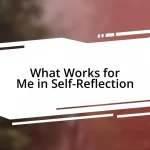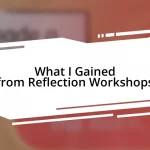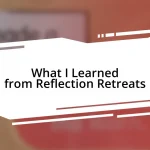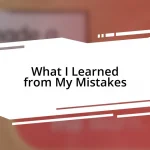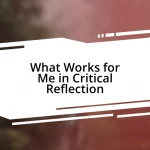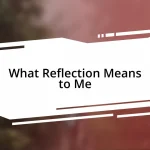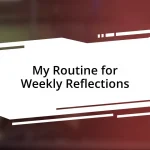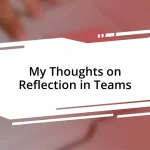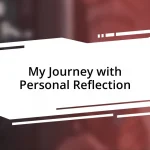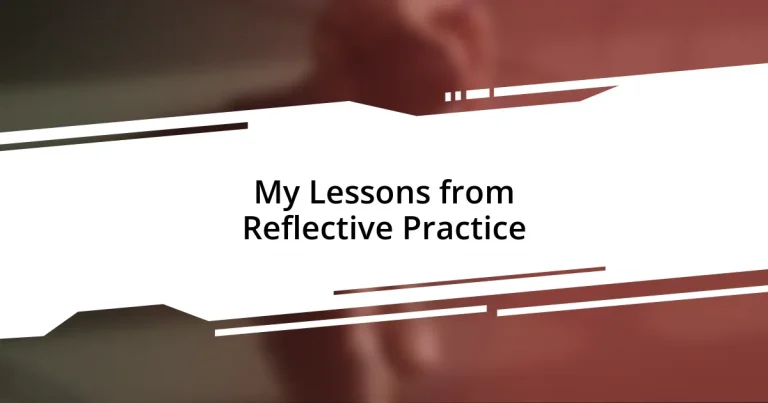Key takeaways:
- Reflective practice fosters personal growth by encouraging individuals to evaluate their actions and decisions, opening up learning opportunities.
- Self-reflection enhances empathy and clarity, allowing for improved connections with others and better decision-making.
- Implementing structured techniques such as journaling and the “What, So What, Now What?” framework helps in deriving valuable insights from experiences.
- Building a reflective habit transforms mindset and resilience, enabling proactive responses to challenges rather than reactive ones.
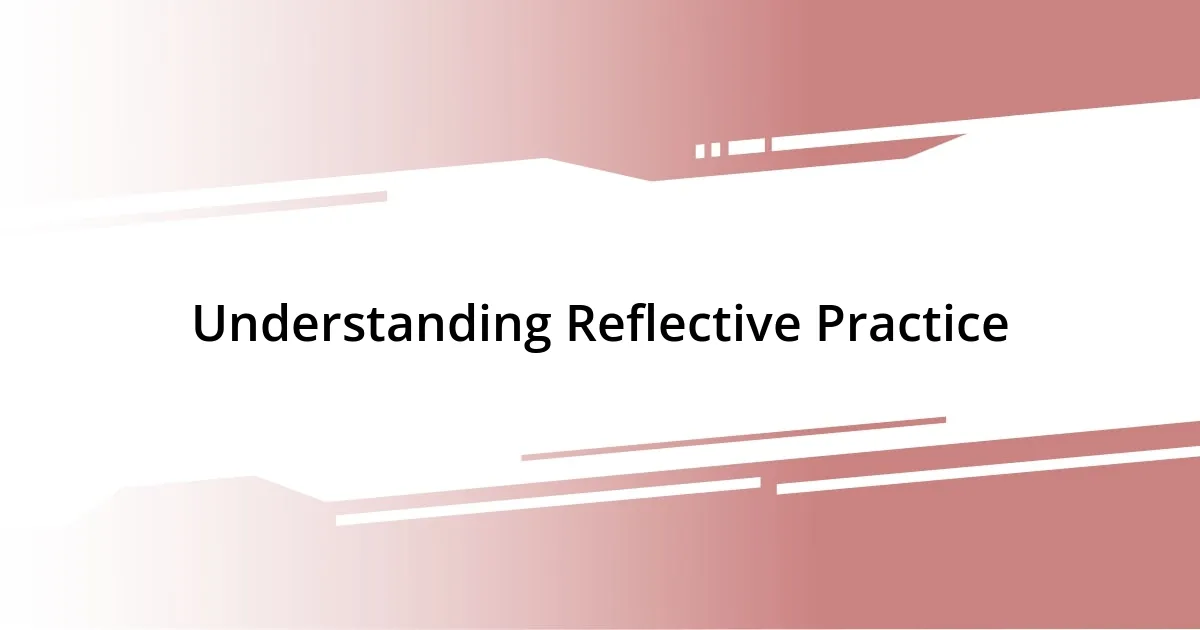
Understanding Reflective Practice
Reflective practice is essentially about looking back on our actions and experiences to gain deeper insights into our behavior and decision-making. I vividly remember a moment when I took the time to reflect on a challenging project. As I wrote down my thoughts, I began to see patterns in my decisions — both good and bad. This realization led me to wonder: how often do we truly pause to evaluate our own work?
In my experience, one of the most powerful aspects of reflective practice is how it encourages continuous growth. For instance, after reflecting on a difficult team meeting, I recognized that my communication style might have contributed to the tension. It struck me: what if we all took a moment after each interaction to ask ourselves what we could improve? This simple shift in perspective can open doors to incredible learning opportunities.
Reflective practice isn’t just a solitary exercise; it’s a conversation with oneself. I often find myself journaling late at night, unraveling my thoughts and feelings about the day’s events. It’s during these moments that I discover unexpected emotions tied to my experiences. Have you ever noticed how writing can clarify your thoughts and reveal hidden insights? Embracing this dialogue enriches our understanding of ourselves and enhances our professional lives.
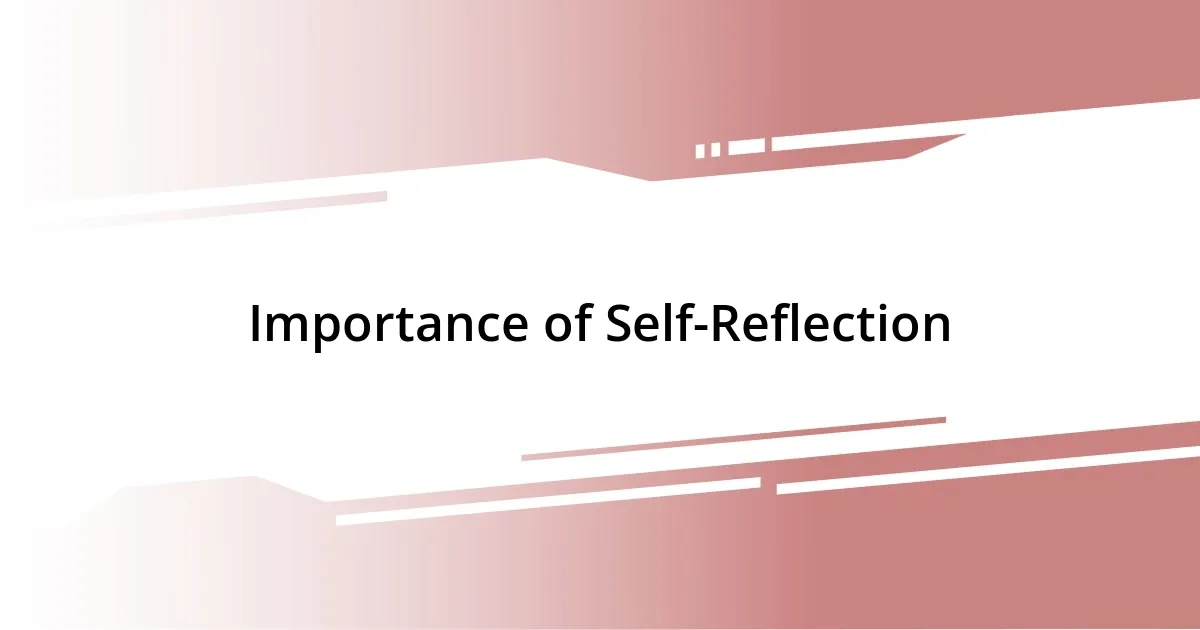
Importance of Self-Reflection
Self-reflection is crucial for personal development. I remember attending a workshop where we were encouraged to reflect on our failures. Initially, I felt uncomfortable, but as I dug deeper, I realized those moments shaped my resilience. It was empowering to identify the lessons within my setbacks. How often do we attribute our growth to success, bypassing the wisdom hidden in our missteps?
Beyond personal growth, self-reflection enhances our ability to connect with others. Reflecting on a time when I struggled to empathize with a colleague, I discovered that my preconceived notions clouded my judgment. After analyzing my thoughts, I learned to approach situations with an open heart. Doesn’t it feel rewarding to forge genuine connections when we pause and consider different perspectives?
Moreover, self-reflection cultivates a sense of clarity. I recall a time when I faced indecision about pursuing a new opportunity. By taking a step back and writing down my priorities, I uncovered what truly mattered to me. This process not only eased my anxiety but also guided me toward a more fulfilling path. Have you ever felt like stepping back provided a clearer view of your journey?
| Benefits of Self-Reflection | Personal Experience |
|---|---|
| Personal Growth | Identifying lessons in failures shaped my resilience. |
| Improved Empathy | Analyzing my judgment led to genuine connections. |
| Enhanced Clarity | Writing priorities eased my indecision and fear. |
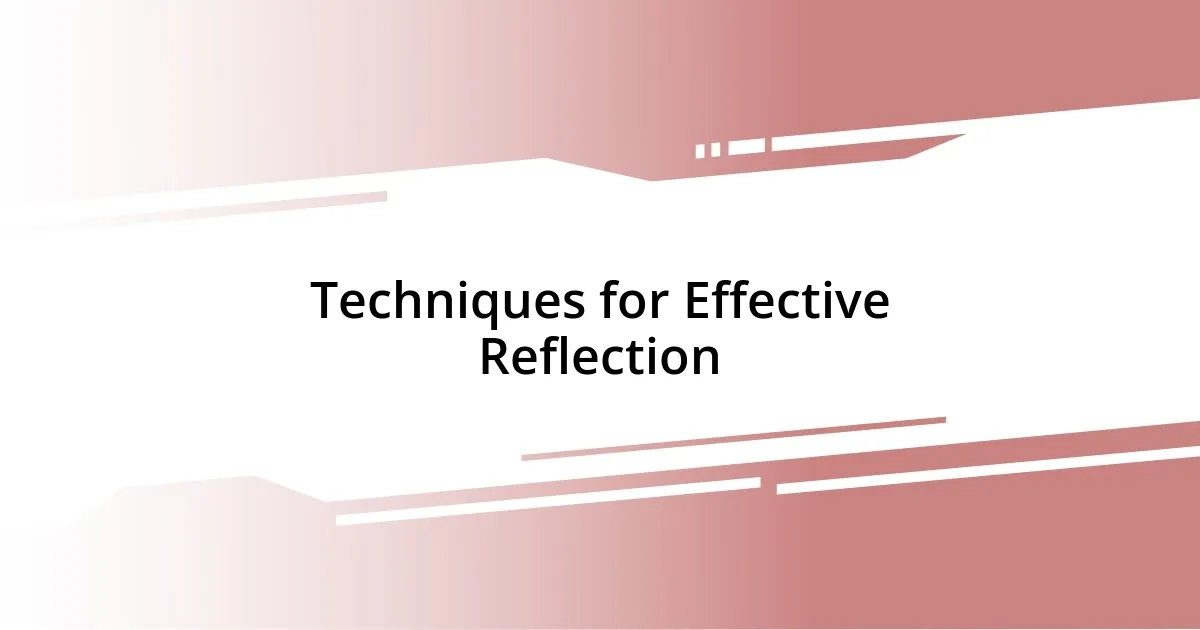
Techniques for Effective Reflection
Reflecting effectively requires intentional techniques that invite deeper insights. One method I’ve found valuable is the “What, So What, Now What?” framework. After experiencing a significant event, I ask myself these three questions to structure my thought process. This approach not only helps me identify what happened but also encourages me to consider the implications and actions to take moving forward. I remember a time when I applied this method after a presentation that didn’t go as planned. By breaking it down, I learned to embrace constructive criticism and transformed my fear into a strategy for improvement.
Here are some techniques I recommend for effective reflection:
- Journaling: Writing consistently can reveal hidden emotions and thoughts, guiding personal growth.
- Mind Mapping: Visualizing my experiences allows me to see connections and patterns that might otherwise remain unclear.
- Peer Feedback: Engaging in reflective dialogue with colleagues often surfaces perspectives I hadn’t considered, enriching my understanding.
- Meditation: Taking time to sit in silence sharpens my awareness and enhances clarity about my experiences.
- Goal Setting: Aligning my reflections with future goals keeps me focused and ensures that I learn from each experience in a meaningful way.
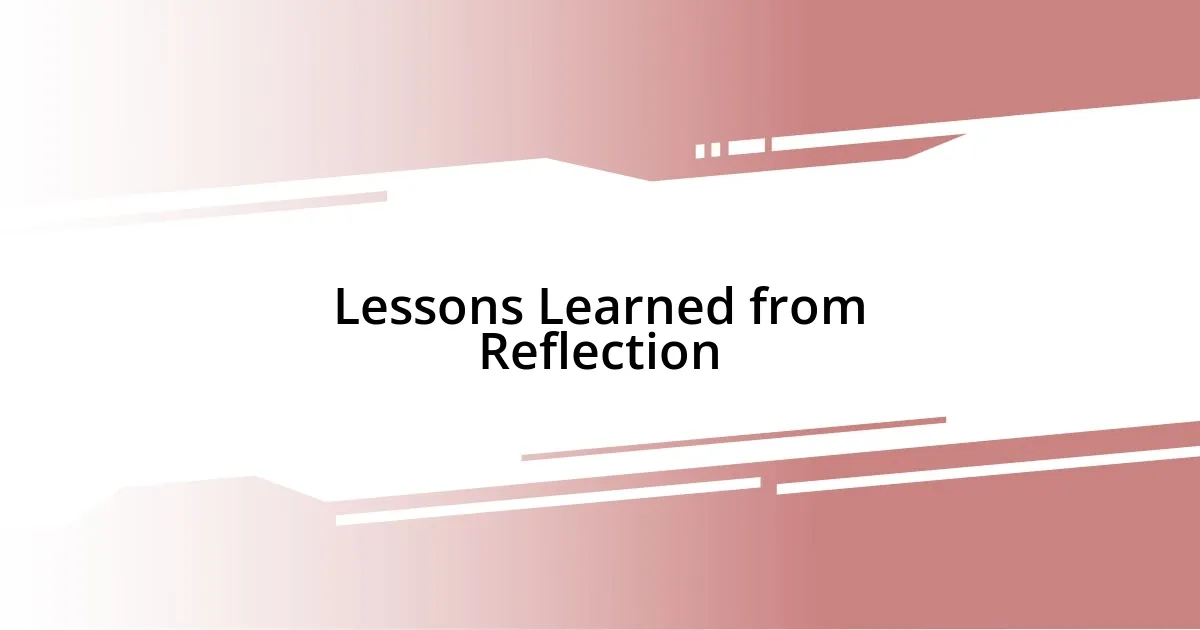
Lessons Learned from Reflection
Lessons learned from reflection can be profound and transformative. I remember one instance when I reflected on a challenging team project that didn’t meet our expectations. I realized that my failure to communicate clearly led to confusion and resentment within the group. This insight made me ask: How often do we overlook the importance of clear communication? It made me commit to being more transparent in my interactions.
Another significant lesson emerged when I sought feedback after a particularly moving workshop on leadership. While I felt confident, the feedback highlighted areas where I could improve, particularly in listening. It was humbling but also thrilling to think that my growth wasn’t a solo journey. It prompted me to wonder how many valuable perspectives I’ve been missing by not actively reaching out for input. This made me enthusiastic about embracing constructive criticism moving forward.
On a personal level, I’ve discovered that reflecting on my emotional responses can illuminate areas that need healing. I recall a recent situation where I reacted strongly to criticism, triggering memories of past experiences. By acknowledging those emotions and their roots, I learned to separate my past from my present, fostering resilience. Isn’t it incredible how diving into our feelings can unlock new understanding and growth?
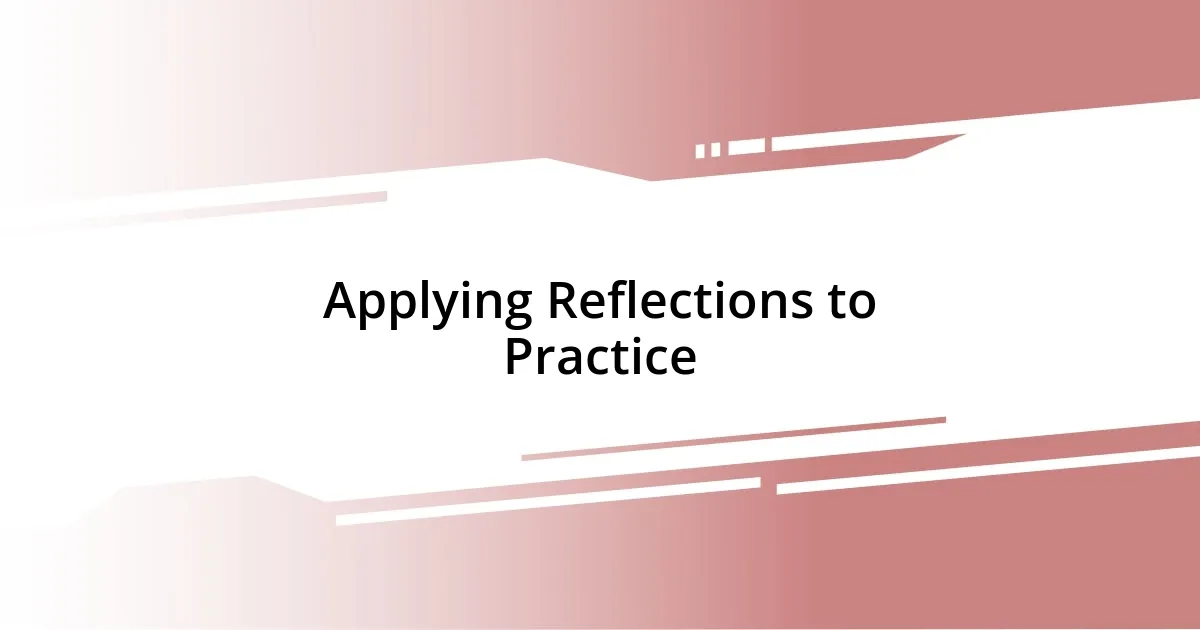
Applying Reflections to Practice
Applying my reflections to practice has been a game changer for me. For instance, after reviewing my notes from a recent training session, I realized I’d been brushing over the need for inclusivity in my approach. Instead of just acknowledging the feedback, I acted on it by incorporating diverse perspectives in future discussions, which enriched our outcomes dramatically. Have you ever considered how small changes in your approach could lead to significant improvements?
One memorable moment occurred when I questioned my time management skills after feeling overwhelmed by competing deadlines. Reflecting on this, I decided to prioritize tasks differently. By using a digital planner, I was able to visualize my workload better. Not only did this shift alleviate stress, but it also boosted my productivity. I’ve come to understand that reflection isn’t just a passive exercise; it’s about actively reshaping our practices for better results.
In another instance, I realized that I was often hesitant to share new ideas, fearing they might be rejected. Reflecting on this insecurity made me confront my fear of vulnerability. By gradually sharing my thoughts in team settings, I found that my contributions were valued, inspiring others to open up too. Isn’t it fascinating how our fears can hold us back, yet through reflection, we can unlock the courage to connect more deeply with others?
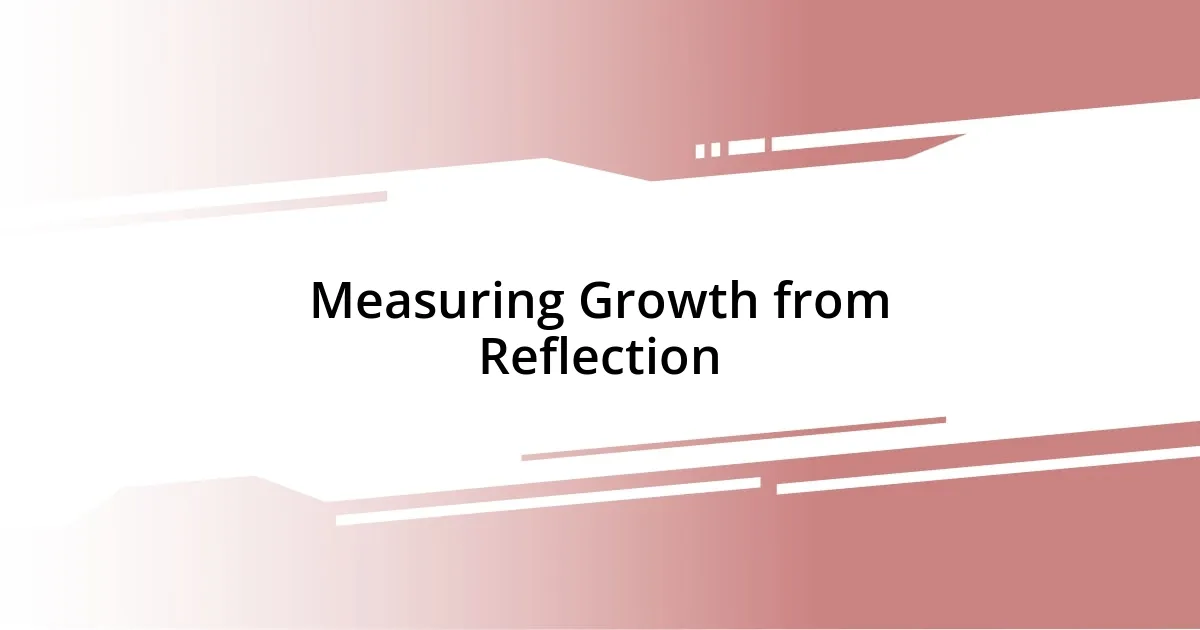
Measuring Growth from Reflection
Measuring growth from reflection is something I’ve come to value immensely. After a particularly challenging week at work, I took a moment to sit down with my thoughts. I realized that tracking my emotional responses in real time, such as during heated discussions, helped me identify triggers that usually went unnoticed. This self-awareness transformed my interactions, enabling me to manage stress more effectively.
Sometimes, I set specific goals to evaluate my growth. For instance, I remember deciding to enhance my public speaking skills after reflecting on a presentation that felt flat. I committed to practicing weekly and sought feedback after each session. The measurable improvement in my confidence and delivery was evident, which made me wonder: how often do we underestimate the power of dedicated practice following reflection?
It’s also fascinating to consider how reflection leads to a shift in perspective. I recall a time when I was fixated on my shortcomings after a tough evaluation, feeling deflated. But as I reflected, I started to view that feedback as a stepping stone rather than a hurdle. This change in mindset only fueled my desire to learn and grow. Have you ever experienced a moment where a simple reflection on criticism turned into a catalyst for lasting change?
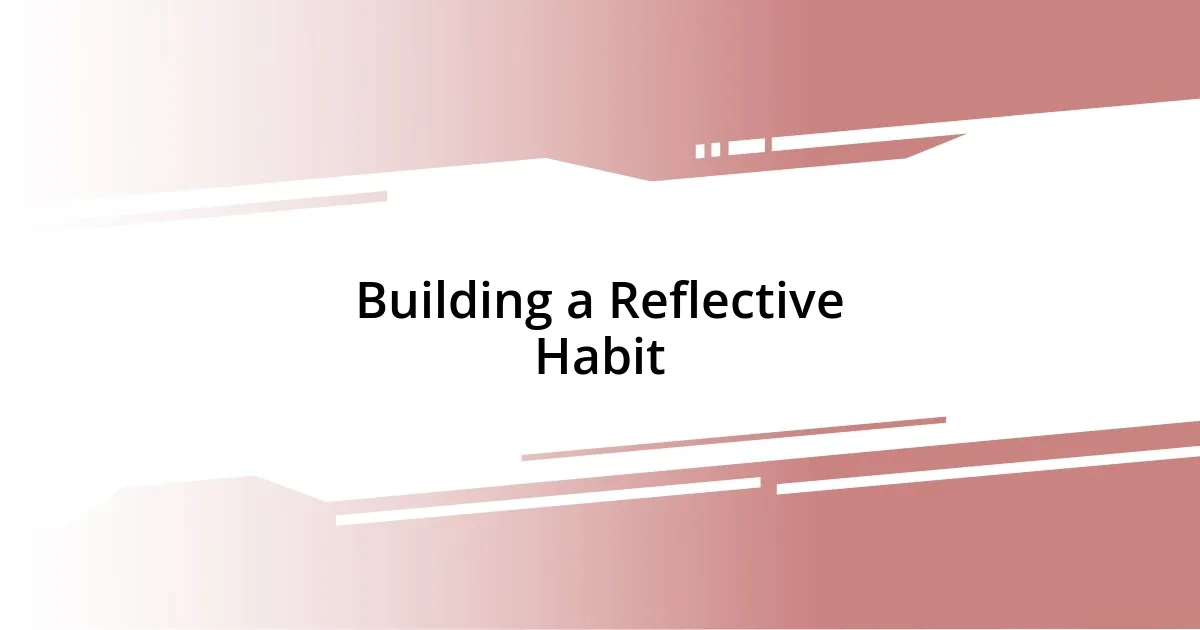
Building a Reflective Habit
Building a reflective habit starts with intentionality. I remember when I first carved out a few minutes at the end of each day to jot down my thoughts. It felt awkward at first, like I was talking to myself in a crowded room. Yet, with each entry, I uncovered patterns in my thinking and behavior that I hadn’t noticed before. Have you ever tried reflecting at the end of your day?
Just recently, I made a commitment to improve my post-project reflections. Instead of rushing to the next task, I took time to gather my team for a debrief. This practice not only allowed us to celebrate successes but also to learn from our missteps collectively. I found that hearing others’ perspectives opened my eyes to blind spots in my own thinking. Isn’t it interesting how collaborative reflection can foster stronger connections within a team?
Incorporating reflection into my daily routine has transformed my mindset. One particular evening, I was feeling frustrated about a project setback. Rather than letting that frustration linger, I sat down, breathed, and wrote about what I’d learned. This shift from reactive to reflective thinking built resilience in me. How often do we allow ourselves to explore our reactions instead of just reacting? Embracing that reflective space has empowered me to approach challenges with curiosity rather than fear.

